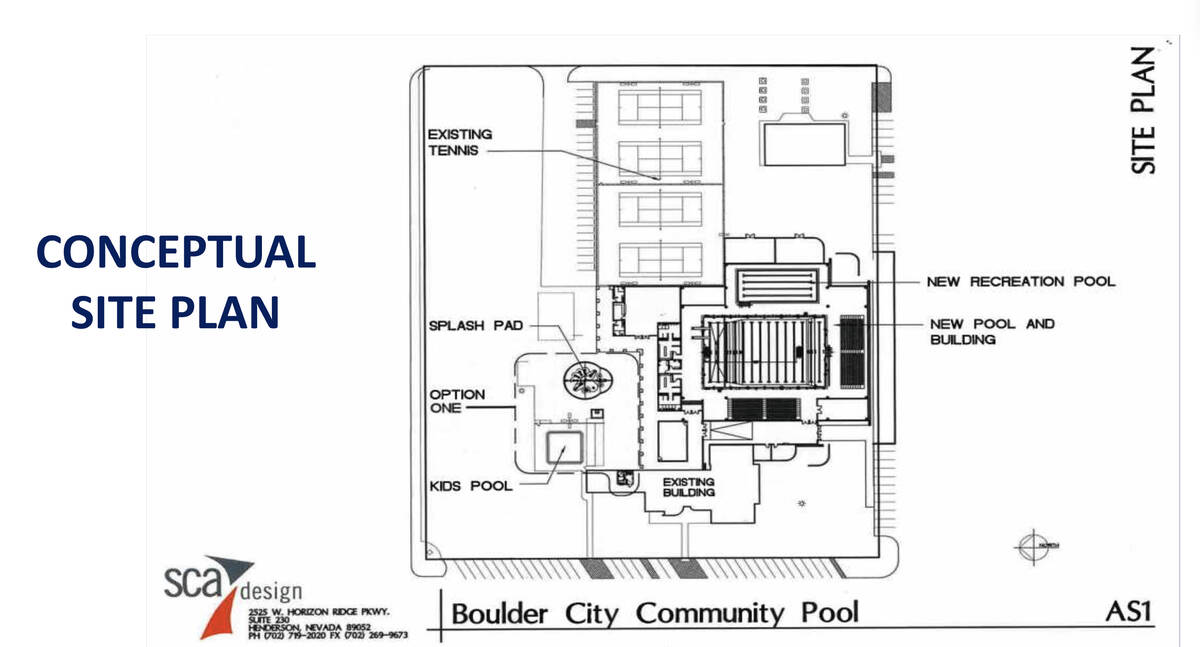Council hears update on pool project
Boulder City Parks and Recreation Director Julie Calloway presented the Boulder City Council Tuesday with an update on the proposed replacement for the city pool, as well as a lengthy justification of the anticipated cost.
“To provide a little background, the current pool facility is over 40 years old,” she said, calling the existing facility, “beyond its useful life and out of date,” with many current building standards.
At the top of the discussion, Calloway made it very obvious that part of her aim was to quell some public questions and concerns about the project’s budget, which has swelled to more than $40 million to replace a facility that is rarely used, according to some estimates, by more than 150 people on any given day in the summer.
“We will be highlighting,” Calloway said, “The fact that taxes will not be increased and that, if approved, the amount not to exceed $9 million from the Capital Improvement Fund (CIF) could move the project forward sooner.”
The $9 million figure actually refers to an additional amount that will be put before voters on the Nov. 5 ballot. (Spending from the CIF is limited and most uses require a ballot initiative in order to actually get budgeted.)
The $9 million amount is actually in addition to $7 million in CIF funding already approved by voters.
The bulk of the funding for the project — more than $18 million — would come from the sale of an area of city-owned land bordering the Boulder Creek Golf Club known as Tract 350. The sale of that land has something of a roller-coaster history.
It was first approved for sale by voters ( per the city’s growth ordinance, any sale of city-owned land greater than one acre in size has to be approved by voters) back in 2010. At that time, the stated intention was to use the proceeds to pay off a bond the city had issued for construction of Boulder Creek Golf Course.
In the wake of the Great Recession, the idea laid fallow until 2016, when the city issued a request for proposal from home builders to develop the land and got not a single response.
Another RFP went out in 2021 and, of the three developers who responded, the city council at the time identified Las Vegas-based Toll Brothers as their preferred developer.
But it was still not smooth sailing. The developer came back with a plan to build as many as 185 homes on the 454-acre site. The plan was initially approved by the council on a tight 3-2 vote. However, as public opposition to that kind of density mounted, Toll Brothers scaled back the plan to 156 homes but also proposed scaling back the purchase price by nearly $20,000 per acre.
This time, with some new faces on the council, the vote was 3-2 against. Current Councilmembers Sherri Jorgensen and Matt Fox had both recently joined the council and both voted against the project.
After a moratorium on construction of new golf courses anywhere in Southern Nevada made land adjacent to existing courses much more desirable, Toll Brothers came back to the city with a new, less-dense plan which the council approved unanimously in May of 2024.
In addition to making a case for funding the project, Calloway laid out the design features that had been recommended by an ad-hoc city commission on pool design.
Originally envisioned as a facility with a 35-meter competition pool, the plan was scaled back in 2021 to a 25-meter wide, 25-yard length, 10-lap pool in order to save, at that point, more than $600,000. The facility would also have a shallower “programming” pool used for activities such as water aerobics and swim lessons.
Calloway noted that the pool project is not going to begin overnight. The biggest question marks —in addition to the already noted ballot question in November —include inflation and actual revenue coming in from the land sale.
While a Toll Brothers representative told the council back in May that they intended to begin pulling building permit allotments during the 2025 fiscal year (which runs until June 30 of 2025), Calloway indicated that they now are hoping for the first part of the land sale to happen in FY 2026. If that happens, she said, and if the ballot initiative is approved, the city could potentially have more than $34 million available to start the construction in FY 2027, which begins on July 1, 2026.
Current cost estimates are just that, estimates done by the design firm. Once the design is finalized, the project has to be sent out for bid. Final costs (which could still be subject to inflationary pressures) can’t be really known until someone has put in a bid to actually build the project.
















